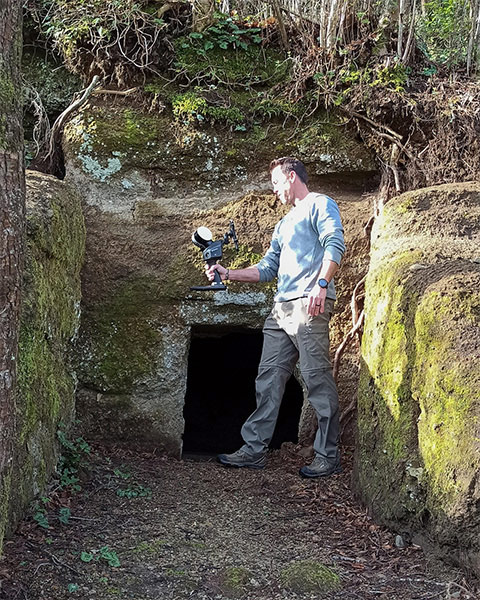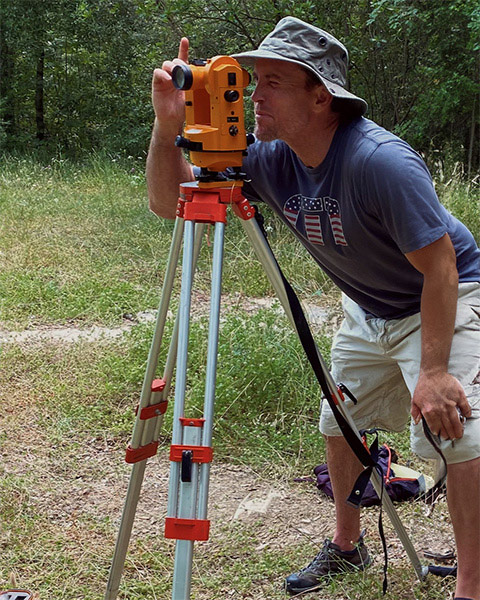From the Phillies to Ancient Rome
Regis alumnus Brad Lidge studies archaeology after retirement from MLB
By Alexis Fatigati
Growing up in south Denver, he loved his geography and world history classes at Cherry Creek High School. His teachers brought the material to life and engaged him and his fellow classmates in a way he remembers fondly.
He also loved sports. He played baseball at Cherry Creek, primarily focusing on hitting and claiming not to excel until his senior year when he switched to pitching. That change paid off, and Lidge was awarded a scholarship to play at the University of Notre Dame, where he studied business until he was drafted by the Houston Astros during his junior year in 1998.
Lidge played in the minor leagues until he was called up to the MLB in 2002 and had an illustrious career over the next few years. He was a two-time All-Star, saved 225 games as a relief pitcher and threw the final pitch to win the World Series with the Philadelphia Phillies in 2008, the first championship for the city in 25 years.
When retirement loomed close in 2013, Lidge said he "realized I am not going to be playing forever, and I absolutely still love world history. I would buy these DVDs on Ancient Greece or Ancient Rome and I would take notes like I was in a class, so I should probably do this for credit."
Lidge decided to finish his bachelor's degree, and he needed some flexibility in how he took classes, which led him to Regis.
"At this point I already had my family," Lidge said. "So that's when I got ahold of Regis because obviously it is a great school in Denver. You can do a lot online, and I figured I might be able to do things in my own backyard."He changed his major to Religious Studies and was trying to combine this new focus on religion with his life-long love of world history. "The physical aspect of archaeology really started to resonate with me. I eventually realized that I loved the Roman Empire, and they were basically everywhere, so I could focus on that culture."

Reflecting on his time as a Regis student, Lidge said "it was the first time in my life that I was really able to focus on academics without athletics. The classes I took at Regis, I was actually able to enjoy them, and some were really eye-opening. They gave me a solid and broader perspective on the culture of the Roman Empire and allowed me to look through a different lens because I was learning more about humanity as a whole. I felt way more informed and confident in what I was talking about."
Lidge started going on excavations in the summer of 2013 in Italy as a student volunteer. After graduating from Regis, he received his master's degree in archaeology from the University of Leicester in England by taking online classes.
He has been a supervisor on excavation sites in Siena, Italy every summer since 2021, and has published his research on sigla, Etruscan symbols that can be letters and numbers, or graphics such as stars and spirals, found on pottery, clay tiles and other objects. Lidge is also working on a project that focuses on the various occupations of people in Southeast Tuscany from the Copper Age through the Middle Ages, using the most up-to-date technology and exploring caves and tombs to see how ancient people lived and worked.

Lidge's family loves to travel to Italy with him while he is doing his research, spending at least a few weeks every summer at the sites helping with the excavations. He said the best thing about retirement is spending time with his wife of 21 years, daughter who is a sophomore in college and son who is in high school, especially since he was on the road so much during his baseball career.
"My years after retirement from baseball as an archaeologist have been the most rewarding for me, because I get to spend every day with my family and also pursue something that I love to do. It is great that I get to study and learn about the things that I love, but also be home to help with homework and things that my kids need."
Lidge is looking forward to his next excavation in Tuscany during the winter of 2025, and still enjoys watching archaeology shows in his free time.

Article by Alexis Fatigati
About the AuthorMore from this issue
Share Your Thoughts
Email us or write in to the Regis University Magazine at 3333 Regis Blvd, L-27, Denver 80221

